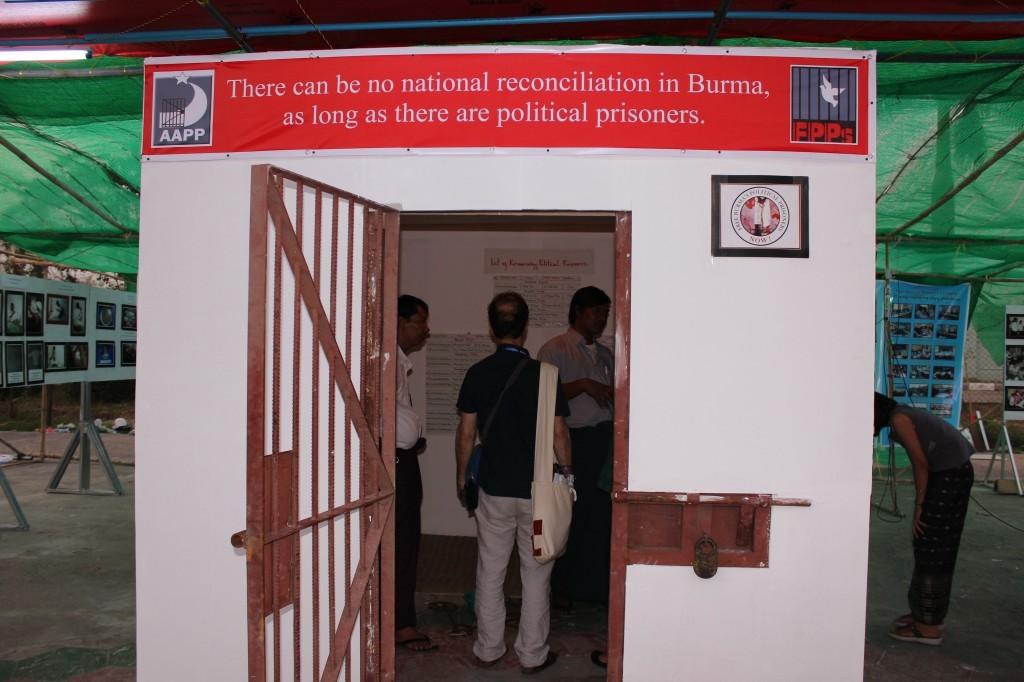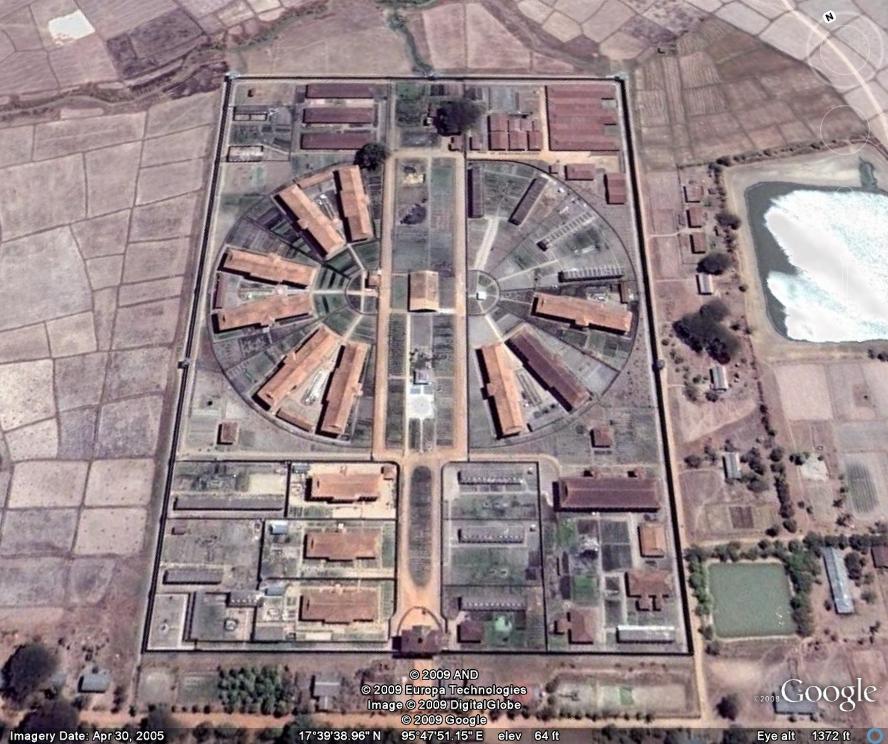Suspicious eyes and a lack of knowledge, funding and security greeted us when we set up the Assistance Association for Political Prisoners (AAPP) in the Thai–Myanmar border town of Mae Sot on March 23, 2000. I myself had never touched a computer before I arrived in Mae Sot. The Internet and mobile phones were barely in use at the time.
I was lucky not to be killed. One of the ethnic armed forces suspected me to be a thug from the Burmese army because my father used to be a soldier, and the place I stayed at the Mae Sot market (one night cost 20 baht—US$.60) was also suspected as a place the Burmese intelligence forces used to gather information.
However, my colleagues from the Thai–Burma border vouched for me, offering their guarantee to that ethnic armed group that I was not that kind of person—I was finally free from suspicion. Since I arrived in Mae Sot, I have been lucky to receive the support from these pro-democratic groups.
Though I live in Thailand, I have no legal documents allowing me to stay. I have been detained many times by Thai authorities because I was regarded as illegal. I have to work with AAPP in this cycle of detention and release.
A vital bridge to ‘the inside’
Working hard in a difficult situation, AAPP earned the trust of ethnic armed forces and international governments and later became a bridge between the inside and outside of Burma.
The organization’s mission depended on proving that there were political prisoners inside Burma—we had to document their existence. First, we had to document the list of political prisoners in Burma. Then, we investigated different prison situations in Burma. We used information from our network inside to write reports to share with diplomats, the United Nations, INGOs and the media.
AAPP caught the attention of media from all over the world, including the BBC, Voice of America, Radio Free Asia, Democratic Voice of Burma, The Irrawaddy, Mizzima and New Era Journal. AAPP became well-known and the issue of political prisoners in Burma rose to the top of the agenda at international meetings with Burma’s military leaders. International leaders used the release of political prisoners as the barometer for measuring Burma’s political progress.
When it was Burma’s turn to serve as chair of ASEAN, human rights groups and US and EU leaders pressured ASEAN to bar Burma from the chair because the Burmese regime refused to release political prisoners and showed little progress on human rights. ASEAN leaders finally agreed and skipped over Burma for the chair.
AAPP joined an ad hoc commission with the National Council of the Union of Burma (NCUB) and the Burma Lawyers’ Council (BLC) to investigate the events of Myanmar’s Black Friday, also known as the Depayin massacre. On May 30, 2003, 70 or more people were killed when Daw Aung San Suu Kyi’s convoy was attacked by pro-government thugs in Sagaing Region’s Depayin Township. The results of the investigations have been presented to governments, human rights groups and the United Nations.
AAPP also worked with Dr. Sein Win’s exiled National Coalition Government of the Union of Burma (NCGUB), the National Council of the Union of Burma (NCUB) and ethnic and democratic forces along the Thai–Burma border. The association has partnered with Burma support groups all over the world, including the US Campaign for Burma, Burma Campaign UK and others, to lobby the US and EU to impose more sanction on Burma’s military junta.
Between 2000 and 2010, AAPP and other groups conducted many campaigns for the release of political prisoners, the 2009 global campaign being the most successful, with more than 80 countries participating. We intended to collect 888,888 signatures, in honor of the 8888 democratic revolution, to call on the UN to make the release of all political prisoners a priority. We collected over 700,000 signatures and presented them to the UN Special Envoy to Burma. Ko Tate, a co-founder of AAPP, was a member of the delegation.
This campaign, along with other reasons, put great pressure on the Burmese military junta to release Daw Aung San Suu Kyi, Min Ko Naing and all political prisoners.

Burma after 2010
The political climate changed inside Burma in 2010 and AAPP changed its vision and mission. Before 2010, our work focused on the release of all political prisoners, assisting incarcerated political prisoners, the reintegration of released political prisoners and pushing for a free political process that would allow the release of political prisoners.
After 2010, we changed our vision to the following: to achieve national reconciliation and to help transform Burma into a free and democratic society, where no political prisoners remain incarcerated and individuals’ civil and political rights are protected, fulfilled and maintained.
As a result of political changes, AAPP leaders were removed from the country’s blacklist. AAPP Secretary Ko Tate Naing and I, as joint secretary, returned to Burma for the first time on Jan. 5, 2013. That year, AAPP was invited to participate in the Committee for Scrutinizing the Remaining Political Prisoners set up by President U Thein Sein. AAPP tried our best to ensure the release of the remaining political prisoners.
Through new offices in Yangon and Mandalay, AAPP provided counseling training to former political prisoners so that they could become counselors. The program created jobs—which still continue today—for 42 former political prisoners, providing support for their family members.
The AAPP provided human rights awareness trainings at government-run schools and universities and in villages. In addition, AAPP holds 12-day basic human rights, human rights documentation and transitional justice trainings for members of political parties, ethnic youth and human rights defenders in all states and divisions in Burma.
AAPP believes that in order to have a rule of law, we need just laws. We focus on advocacy to abolish or review laws that repress the country’s democracy, such as the Peaceful Assembly Law, Telecommunication Law Section 66 (d), the Prisons Law and the laws governing the Myanmar Human Rights Commission.
AAPP also continues working on documenting the number of political prisoners, assisting incarcerated political prisoners, freeing political prisoners and rehabilitating former political prisoners, including support for former political prisoners and their family members.
AAPP has urged the government to handle past cases of human rights violations as a part of transitional justice. In transitional justice, truth is the most important thing. In order to have truth, documentation is necessary. AAPP has conducted interviews with 3,500 former political prisoners to document their experiences, creating a record that will be helpful for truth commissions in the future.

The government still needs to address human right violations from the past—to recognize them and work towards reparations for those who have suffered from the actions of the army or government agents. We work with civil society and ethnic groups to achieve this goal.
We believe we must push for institutional reform as well, to prevent such human rights violations from happening again. AAPP is lobbying and advocacting for prison reform, police reform and a restructuring of the Myanmar National Human Rights Commission.
AAPP encourages international governments, especially the US and EU governments, to apply pressure and engage with Burma, to push for reform of domestic institutions and to invest more in Burma to support job creation.
The issue of political prisoner is directly related to the country’s political and economic situation as well as social equality and federalism for ethnic groups. Because of armed conflicts, villagers near conflict zones are detained arbitrarily and tortured. There are extrajudicial killings. Farmers had their lands confiscated under the military junta in the past and are now fighting to get their land back. As a result, they have been detained and sentenced.
Freedom of the press, freedom of assembly and freedom of speech are basic principles for democracy. However, the government has interpreted these differently and activists and human rights defenders have been detained because they exercise these basic democratic rights. The government must stop.
To solve the issue of political prisoners, the government needs to take a holistic approach. We cannot do this one-by-one, case-by-case. We need to end armed conflict and we also need to solve land grab problems justly and quickly. The government needs to allow people to practice basic democratic principles such as the freedoms of speech, assembly and press. We need a law to protect workers. If the government does not allow people to practice civil and political rights, Burma will never be proud among the international community and more sanctions will come.
We intended to dissolve AAPP as soon as possible after we established it in 2000. But to do so, we need to create a society where there are no political prisoners. I hope we will reach that goal soon. To achieve it, we need the government to respect human rights and we need people who respect human rights. Though our name is the Assistance Association For Political Prisoners, what we are doing is about more than the release of political prisoners. It’s about achieving national reconciliation and helping to transform Burma into a free and democratic society, where no political prisoners remain incarcerated and individuals’ civil and political rights are protected, fulfilled and maintained.
It’s a long way to go but we are marching to it.
Bo Kyi
AAPP Joint Secretary
You may also like these stories:
NLD Proposal to End Immunity for Myanmar’s Ex-Military Govt Fails to Pass in Charter Vote
NLD’s Bid to End Myanmar Military’s Constitutional Grip on National Security Voted Down

















